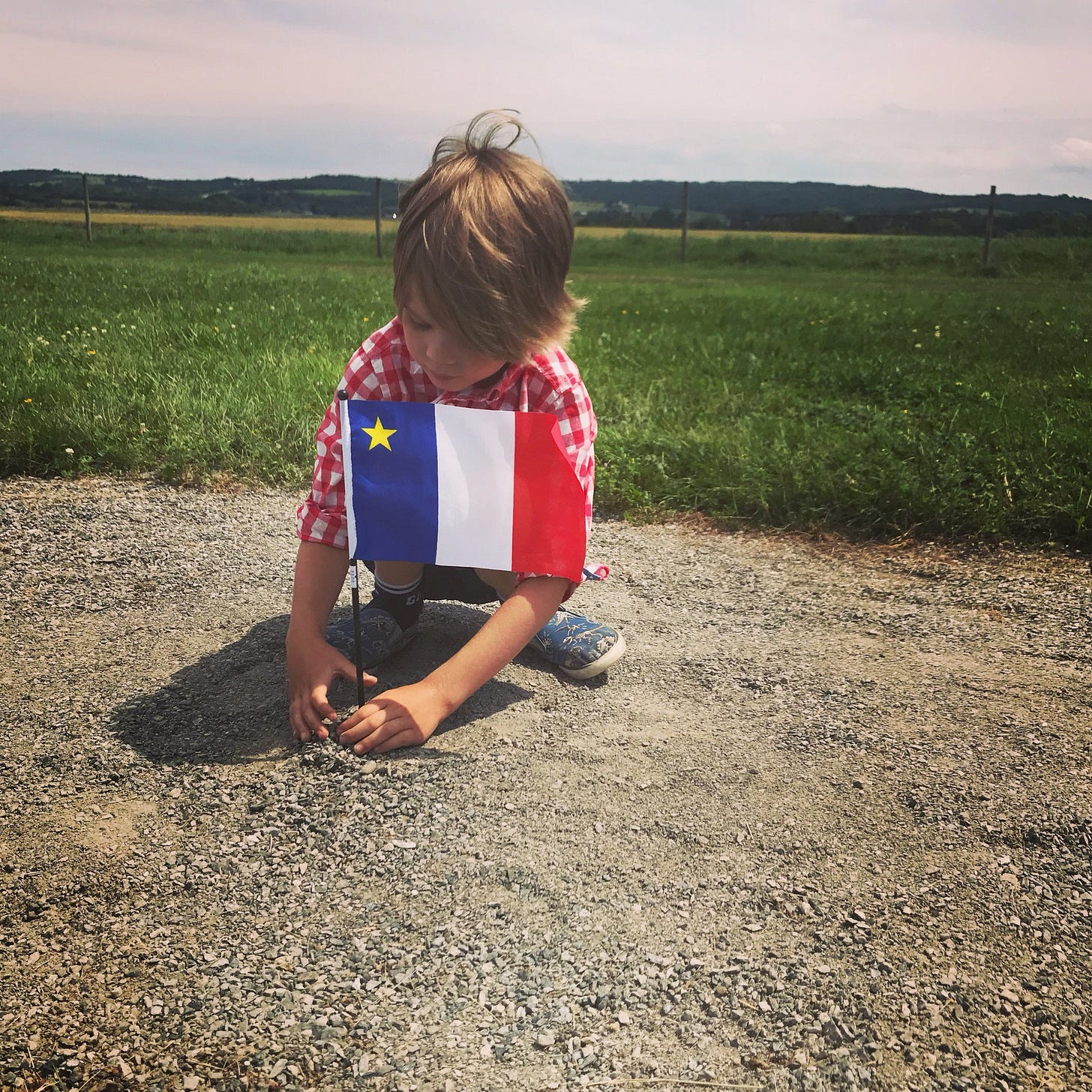Au cœur de la diaspora | Deep in the Diaspora
En conversation avec l’auteure acadienne Anne Thériault | In Conversation with Acadienne author Anne Thériault
The English text follows
Au cœur de la diaspora
En conversation avec l’auteure acadienne Anne Thériault
À l’occasion du Jour de commémoration du Grand Dérangement, Anne Thériault parle de la diaspora acadienne, de l’histoire vivante et de l’avenir du français dans sa propre famille.
En Anne Thériault, je vois le récit acadien d’une langue perdue et retrouvée au fil des générations. C’est de toute beauté. Si elle est aussi la personnification des Acadien.ne.s et Canadien.ne.s français.e.s dont la relation avec le français est compliquée, elle une grande ambassadrice de la langue française et de la culture acadienne. Une icône pour les Acadien.ne.s qui habitent la diaspora, la vraie et la symbolique. Et pour qui, en vertu de l’histoire du Canada, l’anglais est parfois une première langue, ou une langue plus confortable.
Et voilà pourquoi cette conversation avec Anne — en ce Jour de commémoration du Grand Dérangement — est si importante.
« J’ai grandi au cœur de la diaspora. Je croyais être Québécoise. Mais mon père disait toujours, non, non – tu es Acadienne. »
Sans doute l’une des écrivaines acadiennes les plus connues au Canada, l’étoile d’Anne Thériault a gravi les échelons au cours de sa remarquable carrière, depuis ses débuts en tant que blogueuse féministe aux lèvres colorées, jusqu’à honorer les têtes de mât des revues The Walrus, Flare, et Jezebel avec des pièces perspicaces sur des thèmes allant de la vie des reines célèbres et des saints catholiques, à ses explorations inlassables de notre façon de parler de la santé mentale.

Anne est aussi connue pour susciter la conversation sur la langue française et l’expérience francophone au Canada. Qu’il s’agisse de son fil Twitter sur le « Rosbif » ou de ses éloges pour l’expression « faire la grasse matinée », son esprit remarquable transcende, initiant son vaste public à la beauté et aux bizarreries du français, et en particulier, mettant en lumière l’expérience de la diaspora acadienne.
« Mes grands-parents et mes arrière-grands-parents ont grandi au Canada à un moment où c’était vraiment un désavantage social d’être Acadien », a expliqué Anne à La Tourtière. « Mon arrière-grand-mère est arrivée à Halifax à 18 ans – elle ne parlait pas anglais. Elle a trouvé un boulot de femme de ménage à l’hôpital. Puis elle a épousé mon arrière-grand-père, qui était anglophone. Et à partir de ce moment-là, elle n’a plus jamais dit un mot de français. »
« Mon côté acadien a un vrai sentiment de déracinement », explique Anne, faisant allusion au Grand Dérangement, lorsque, en 1755, les Acadiens ont été violemment déportés des foyers qu’ils avaient connus depuis des générations vers des territoires hostiles et éloignés de l’empire britannique.
« Lorsque j’ai visité de vieilles communautés acadiennes, j’ai été très ému de penser que mes ancêtres ont été littéralement arrachés à leurs villages, que les Britanniques ont brûlés devant eux. Ils ont été séparés de leur famille et embarqués sur des navires. J’ai beaucoup pensé à la survie de ces communautés! »



Anne a grandi dans les banlieues bilingues de Montréal et dans la communauté anglophone de Kitchener, a étudié à Halifax, près des communautés ancestrales de l’Acadie, et a travaillé pendant plus d’une décennie dans la franco-métropole internationale de Toronto. Errante, elle est chez elle dans la diaspora. Et profondément liée à la langue française et à la pratique de sa culture.
« J’ai une relation de toute une vie avec le français », dit-elle. « Ma mère parle assez bien le français parce qu’elle a grandi au Québec. Pour elle, c’était vraiment important que j’apprenne le français. Et en fait, c’est grâce à elle, mon parent anglophone, que je me suis qualifiée pour l’école française. Elle était allée à la maternelle en français. »

Anne cite La Sagouine d’Antonine Maillet, le combattant de la liberté Joseph Broussard dit Beausoleil (« fun fact – c’est un ancêtre de Beyoncé! ») et le héros du hockey Jean Béliveau comme quelques-unes de ses icônes acadiennes bien-aimées. Cependant, c’est la Vierge Marie, la Stella Maris et patronne des Acadiens, qui l’inspire le plus dans la pratique de sa culture.
« Il y a certainement un lien acadien! » s’exclame-t-elle. « C’est drôle, parce que je n’ai pas vraiment été élevé catholique. J’ai fréquenté l’école catholique parce que c’était la seule école francophone. »
Que ce soit par son amour et son exploration du catholicisme ou de la langue française, Anne entreprend le travail minutieux de reconquérir son droit de naissance à la communauté, à la culture et à la langue – pour elle-même, et son jeune fils, qui a inspiré l’un de ses fils Twitter les plus poignants à l’occasion de la Fête nationale de l’Acadie en 2018.
« Mon fils avait ce petit drapeau acadien qu’il plantait dans le sol », dit-elle, debout avec lui à Horton’s Landing, en Nouvelle-Écosse, où les Anglais ont rassemblé les Acadiens pendant le Grand Dérangement en 1755. « Nous sommes toujours là après 400 ans. Et nous avons toujours un sentiment d’identité. Un sentiment de soi. »

« Mes ancêtres étaient des survivants », a-t-elle écrit ce jour-là. « Même en perdant tout ce qu’ils avaient - leur patrie, leurs familles, leurs biens, tout leur mode de vie - ils ont continué à survivre. Ils survivent encore grâce à moi. »
Les ancêtres acadiens d’Anne survivent aussi grâce à l’émergence de la prochaine génération : « Mon fils parle français », sourit Anne. « C’est excitant. C’est plein d’espoir. »
Deep in the Diaspora
In Conversation with Acadienne author Anne Thériault
On the Jour de commémoration du Grand Dérangement, Anne Thériault talks Acadian diaspora, living history and the future of French in her own family.
In Anne is the Acadian story of a tongue lost and found after generations. It’s a thing of beauty. If she is the embodiment of Acadians and French Canadians whose relationship with French is complicated, she is also an incredible ambassadress of the French language and for Acadian culture. An icon for Acadians who live in diaspora, both actual and symbolic, and for whom English is sometimes a first or more comfortable tongue, simply because history of Canada.
And that’s why this conversation with Anne on the Day of Commemoration of the Great Upheaval was so important.
“I grew up deep in the diaspora. I thought I was Québécoise. But my dad would always say, no, no – you’re Acadian.”
Arguably one of Canada’s best-known Acadienne writers, Anne Thériault’s star has ascended over the course of her remarkable career, from her early days as a red-lipsticked feminist blogger, to gracing the mastheads of The Walrus, Flare, and Jezebel with insightful pieces on themes ranging from the lives of infamous queens and Catholic saints, to her unflinching explorations of how to talk about mental health.

Anne is also known for sparking conversation about the French language and the Francophone experience in Canada. Whether it’s her comical ‘Rosbif’ Twitter thread or her lavish praise for the French tongue’s hedonistic description of “a fat morning,” her noteworthy wit transcends, initiating her vast following to the beauty and quirks of French and in particular, shining a light on the Acadian experience in the diaspora.
“My grandparents and my great grandparents grew up at a time in Canada where it was really a social disadvantage to be Acadian,” Anne told La Tourtière. “My great-grandmother moved to Halifax when she was 18 – she didn't speak any English. She got a job as a scullery maid in the hospital. And, then she married my great-grandfather, who was Anglophone. And from then on, she never spoke a word of French again.”
“My Acadian side has a real kind of sense of rootlessness,” Anne explains, alluding to the Grand Dérangement, the Great Upheaval, when in 1755 Acadians were violently deported from the homes they had known for generations to inhospitable and distant territories in the British empire.
“When I visited old Acadian communities, it was very emotional for me to think that my ancestors were literally ripped from their villages, which the British burned in front of them.They were separated from their families. They were put onto ships. And to think of the survival of those communities!”



Anne grew up in the bilingual banlieues of Montreal, Québec, and in the anglophone community of Kitchener, Ontario, studying in Halifax – near the ancestral communities of Acadie, and working for over a decade in Toronto’s international franco-métropole. Errante, or wandering, at home in the diaspora. And deeply connected to the French tongue and the practice of her culture.
“I have a lifelong relationship with French,” she says. “My mom actually does speak pretty decent French from having grown up in Quebec. For her, it was really important that I learn. And actually, it was through her – my anglophone parent – that I qualified for French school. She had gone to kindergarten in French.”

Anne cites Antonine Maillet’s La Sagouine, freedom fighter Joseph Broussard dit Beausoleil (“fun fact – he’s an ancestor of Beyoncé!”), and hockey hero Jean Béliveau as some of her much-loved Acadian icons. However, it is the Virgin Mary, the Stella Maris and patron saint of Acadians, that most inspires her in the practice of her culture.
“There’s definitely an Acadian connection!” she exclaims. “It’s funny, because I wasn’t really raised Catholic. I went to Catholic school because it was the only francophone school.”
Whether it is through her love and exploration of the Catholic faith or the French language, Anne is undertaking the careful work of reclaiming her birthright to community, culture, and tongue – for herself, and her young son, who inspired one of her most poignant Twitter threads in celebration of National Acadian Day in 2018.
“My son had this little Acadian flag – and he was planting it in the soil” she says, standing with him at Horton’s Landing in Nova Scotia, where the English rounded up Acadians during the Grand Dérangement in 1755. “We’re back here after 400 years. And we still have a sense of identity. A sense of self.”

“My ancestors were survivors,” she wrote that day. “Even in the face of losing everything they knew - their homeland, their families, their possessions, their entire way of life - they kept surviving. They are still surviving through me.”
Anne’s Acadian ancestors are also surviving through the emergence of the next generation: “My son speaks French,” smiles Anne. “It’s exciting. It’s hopeful.”




Thank you. I posted this to my Facebook feed. With a shout-out to you for being my first follower on a page that is still pregnant. (: